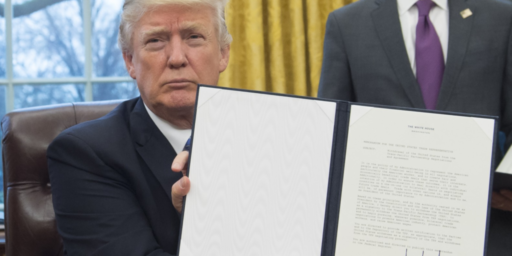Germany Open for Immigration
The times they are a changing.

POLITICO (“Germany plans overhaul of immigration system, citizenship laws“):
In a new effort to attract talented foreign workers to the country, Chancellor Olaf Scholz announced plans to reform Germany’s immigration system and citizenship laws.
On Monday, Scholz reiterated his backing for Interior Minister Nancy Faeser’s plans to overhaul the rules to make naturalization easier for immigrants, who he has lauded as playing an integral role in rebuilding and strengthening Germany. Naturalization figures in Germany are stagnating, with 1.3 acquisitions of citizenship per 1,000 persons; according to Eurostat, that’s below the EU average of 1.6 acquisitions per 1,000.
With job vacancies at an all-time high — 853,315 openings were reported in 2022 through October, according to data analytics firm Statista — Berlin is looking at high-skilled labor from abroad to fill that gap.
Scholz announced at an event in Berlin that his Cabinet will decide on “key points” for skilled labor immigration reform on Wednesday. The chancellor said that a “transparent, unbureaucratic” points-based system will be introduced, as has long been standard practice in other countries. It will also become easier for foreigners to take up studies or vocational training.
According to Faeser’s plans for the citizenship law reform, immigrants will be allowed to have dual citizenship. Furthermore, they will be able to become naturalized Germans in five years instead of eight, according to a 39-page draft of the plan previewed by some media outlets on Friday. In the case of “special integration achievements,” such as voluntary work or exceptional language skills, naturalization will be possible after three years. And children born in Germany to foreign parents can become German if one or both of their parents’ official residence has been in Germany for five, instead of eight, years.
“Those who live and work here permanently should also be able to vote and be elected … with all the rights and duties that go with it,” Scholz said on Monday. However, he cautioned that there are limits to the country’s ability to absorb immigrants.
While this seems like a no-brainer from an American perspective—we’ve long renewed ourselves by accepting immigrants and allowing them to become full-fledged citizens—this is a stunning move for Germany. Generations of Turkish immigrants came to work in Germany but they remained Gastarbeiter (guest workers) and their German-born children and grandchildren remained Turks. On his last day in office, President Reagan quoted a letter writer, “You can go to live in France, but you cannot become a Frenchman. You can go to live in Germany or Turkey or Japan, but you cannot become a German, a Turk, or a Japanese. But anyone, from any corner of the Earth, can come to live in America and become an American.”
That has slowly changed. Germany loosened up their citizenship and immigration laws in 2000 and 2005, and there are now large numbers of Germans of Turkish descent. Still, this is a huge step and, naturally, one not without controversy.
Not everyone is on board with the plans. Criticism comes from the opposition, as well as Scholz’s business-friendly coalition partner, the FDP. “Selling off German citizenship does not promote integration,” said opposition politician Alexander Dobrindt of the center-right CSU.
The FDP’s secretary-general, Bijan Djir-Sarai, meanwhile, said it is too early for such a far-reaching reform, adding that first, repatriations must be enforced more quickly.
A spokesman for the interior ministry reiterated Monday that the draft law for the citizenship reform is “as good as ready.” It will be coordinated within the government “in the next few days” and discussed by the Cabinet “soon.” Responding to the criticism from the government’s coalition partners, the spokesperson said the draft was “exactly in line” with the coalition agreement.
Ultimately, the Germans, like other post-industrial societies, have little choice. They’re not producing enough ethnic Germans to keep their economy going. Immigration is the only viable way to solve that problem, even if it creates others in a relatively homogeneous society.





Immigration is the only viable way to solve that problem, even if it creates others in a relatively homogeneous society.
Sure, but doom has been foretold for Germany since it started taking in refugees and none of that has come true. No modern society is relatively homogenous in any way shape or form. It just seems that way if something superficial changes and if you let it be that way. I think a slim majority will almost always eventually come to this conclusion. It’s the large minority of people who we have to worry about reacting to a change in ‘homogeneity’.
I lived in Germany as a teen, and could easily/happily live there again. I doubt they need English-language based freelance writers though.
@Modulo Myself: I suspect that few ancient societies were really homogenous, either. Any society big enough to go to war was probably big enough to return from it with foreign chattel human property. Mostly? Sure, but that is also true of most modern ones still.
I was going to snark about that comment but decided not to. We all know how that aspiration has worked during the course of American history. And it’s possible that even Reagan would be dismayed to see how his aspiration is being greeted among his ideological heirs. Anything is possible.
This is all very ironic since German aggression in the 1800s and 1900s was based partially on their population growth and the need for more land.
@Jen:
I’ve never “lived” there, but I have spent 6 months there twice, and could easily live there full time.
In Slouching Toward Utopia Brad DeLong talks about globalism before WWI. Trade was a large percent of GDP and between 1870 and 1914 7% of world population changed not just their country of residence but their continent. Immigration is, in Sammy Alito’s phrase, deeply rooted in history.
It’s good that Germany is opening, at least to skilled immigrants. Wake me up when they welcome climate refugees from Africa.
@Jen: Heading back to Berlin this weekend for a week, will be my 6th trip to Deutschland in the past year and half. This is great news for me, as I have advanced degrees and am (obviously) plotting how to immigrate.
Is there a consensus yet on whether or not the declining US birthrate threatens our economic power?
@DK: From what I read in my occasional forays into the right -wing blogosphere, both the problem and the solution pose dire dangers for our economic power. It’s the classic neo-Malthusian breakdown writ large.
@gVOR08:
In the last couple of years, Germany took in around 800,000 refugees from Syria alone – a bit under 1% of Germany’s total populaton.
Regarding refugees (as opposed to “regular” immigrants), Germany has been far more welcoming than, for instance, the US.
On the other hand, how high of a bar is “more welcoming than the US” particularly during Obama’s second administration (no fault of his to my recollection) and that of the age of MAGA?
@DK: Not really, because the US is already a nation of immigrants and that keeps our population growing (both through immigration and the fact that immigrants have larger families than the US average). Nearly 15% of our population was born outside the US. I wonder if anyother significantly sized country even comes close. Australia? New Zealand?
@MarkedMan: The US is waaay down the list in terms of foreign-born population, with dozens of small nations with much higher percentages than the US. Even looking at larger nations, we’re nowhere near the top: 30% of Australia’s population is foreign-born; 29% of New Zealand; 21% in Canada; and I counted 15 European nations with higher foreign-born populations than the US on this chart.